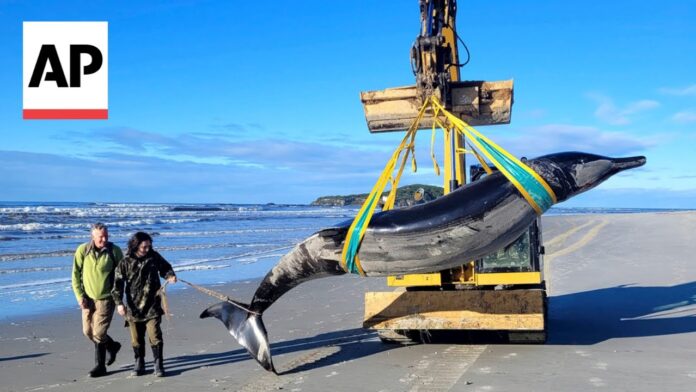A male spade-toothed whale, possibly the world’s rarest, has been discovered on a remote New Zealand beach, prompting urgent conservation actions.
In a significant discovery for marine biology, what appears to be the world’s rarest whale species has washed ashore on a secluded beach near Taiari Mouth in New Zealand. The Department of Conservation (DOC) was alerted to the find, where a five-meter-long beaked whale drew attention due to its unusual characteristics and scarcity in sightings.
Upon thorough examination and consultation with marine experts, it has been tentatively identified as a male spade-toothed whale. This species is exceptionally rare, with historical records documenting only six confirmed specimens worldwide since the 1800s. Remarkably, nearly all of these sightings have been in New Zealand waters, highlighting the nation’s crucial role in the conservation of this elusive marine mammal.
Gabe Davies, the DOC’s Coastal Otago Operations Manager, emphasized the significance of this discovery: “Spade-toothed whales are among the most enigmatic and least understood large mammals known today. The rarity of this find underscores its importance both scientifically and for conservation efforts.”
Working in collaboration with the local council Te Rūnanga ō Ōtakou, DOC is carefully planning the next steps in accordance with Maori traditions regarding the handling of the whale’s remains. Currently, the specimen is being stored in a cool environment to preserve its integrity while decisions are being made.
This freshly discovered specimen presents a unique opportunity for scientists to conduct the first-ever dissection of a spade-toothed whale. Given its rarity, discussions on how to proceed will be deliberated over an extended period due to the international significance of this find.
Genetic samples extracted from the whale have been sent to the University of Auckland, custodians of the New Zealand Cetacean Tissue Archive, for detailed analysis. The process of DNA analysis and species identification could take several weeks to months, providing crucial insights into the genetics and lineage of this elusive species.
The spade-toothed whale was initially described in 1874 based on a lower jaw and teeth collected from Pitt Island/Rangiauria in the Chatham Islands. Subsequent discoveries of skeletal remains on Whak*ri/White Island and Robinson Crusoe Island in Chile supported the confirmation of this distinct species. Recent findings in the Bay of Plenty and north of Gisborne have further contributed to understanding the species’ physical characteristics and colouration patterns.
Analysis:
- Political: The discovery of the spade-toothed whale underscores New Zealand’s role in marine conservation and its commitment to preserving endangered species. It highlights the need for international cooperation in protecting rare marine mammals.
- Social: This discovery resonates with global efforts to conserve biodiversity and raises awareness about the importance of marine habitats. It prompts discussions on the impact of human activities on marine life and the necessity for sustainable conservation practices.
- Environmental: The rarity of the spade-toothed whale underscores gaps in our knowledge of marine biodiversity. It underscores the importance of preserving marine ecosystems to safeguard endangered species like the spade-toothed whale.
- Scientific: The find presents a unique opportunity for scientific research into the genetics, behaviour, and ecology of the spade-toothed whale. It contributes valuable data to ongoing efforts to understand and protect endangered marine species.
Conservation: The classification of the spade-toothed whale as ‘data deficient’ in New Zealand’s Threat Classification System highlights the urgent need for targeted conservation efforts and further research to ensure the survival of this rare species.
